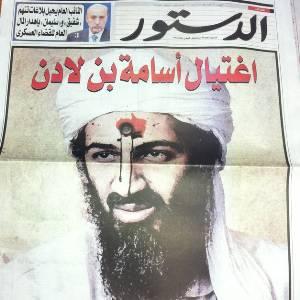Egypt and the death of Bin Laden
Egypt’s al-Dostour newspaper (Photo: Matthew Bell)
by Matthew Bell
The independent Egyptian newspaper Al-Dostour might have today’s most dramatic front page. It’s a huge picture of Bin Laden’s face, framed by his white turban and mostly black beard… with a bloody bullet-hole in his forehead. The headline blares, “The Assassination of Osama Bin Laden.” At Cairo University, a quick survey of students brings a range of responses to the news of Bin Laden’s death.
“Really, I feel sad. He is in my opinion a hero,” said one man. “I don’t agree about all his ideas, but he was an Islamic fighter.”
“Hero, no. He’s not a hero at all,” said a woman. “Maybe for some extremist people, but for normal people he’s not a hero at all. He gives a bad image for Islamic people. So we don’t sympathize with someone like that.” ‘
Osama bin Laden was the son of a prominent Yemeni-born businessman and his Syrian wife in Saudi Arabia.
As a young man, bin Laden fell in with the Muslim Brotherhood, an Islamist group founded in Egypt.
He would later expand upon the Brotherhood’s vision for an Islamic state and agitate for Muslim domination of the Middle East.
Reaction of the new leadership
The first official response from Egypt’s government to the news was “no comment.”
The Muslim Brotherhood, on the other hand, referred to Bin Laden with the honorific title of “sheik” and said he was a martyr, though in an online statement today, the Islamist group condemned the use of violence. Its leaders say, now that the US has finally gotten rid of its top terrorist enemy, Washington and its allies need to get out of Iraq and Afghanistan, and stop trying to impose its will on the Middle East. Essam al-Arian is the deputy leader of the Brotherhood’s political party.
“After killing Osama Bin Laden, after killing millions of Muslims and Arabs, now we are in a new era. The Arabs now are wanting for freedom, justice, the state of law,” al Arian said. “Now the image of Muslims and Arabs must be changed in the west.”
But others point to the political upheaval the Middle East and north Africa as an opportunity for the West to move beyond just fighting terrorist groups like the one Bin Laden built. Rania is another student at Cairo University.
“I disagree totally with him, but instead of killing someone like Osama bin Laden, you should stop what happens daily in Libya, in Syria. It’s very critical; dead children and dead women, dead old people. And if you see daily what happens, it’s like a disaster.”
Another example of starkly different reactions to the news has come from Palestinian leaders who are gathering in Cairo to sign a reconciliation agreement tomorrow.
Officials from the US-backed Palestinian Authority in the West Bank said Bin Laden’s death was good for peace. While leaders of the Islamist group Hamas — which controls the Gaza Strip — condemned the killing of someone they called an Arab holy warrior.
Our coverage reaches millions each week, but only a small fraction of listeners contribute to sustain our program. We still need 224 more people to donate $100 or $10/monthly to unlock our $67,000 match. Will you help us get there today?
